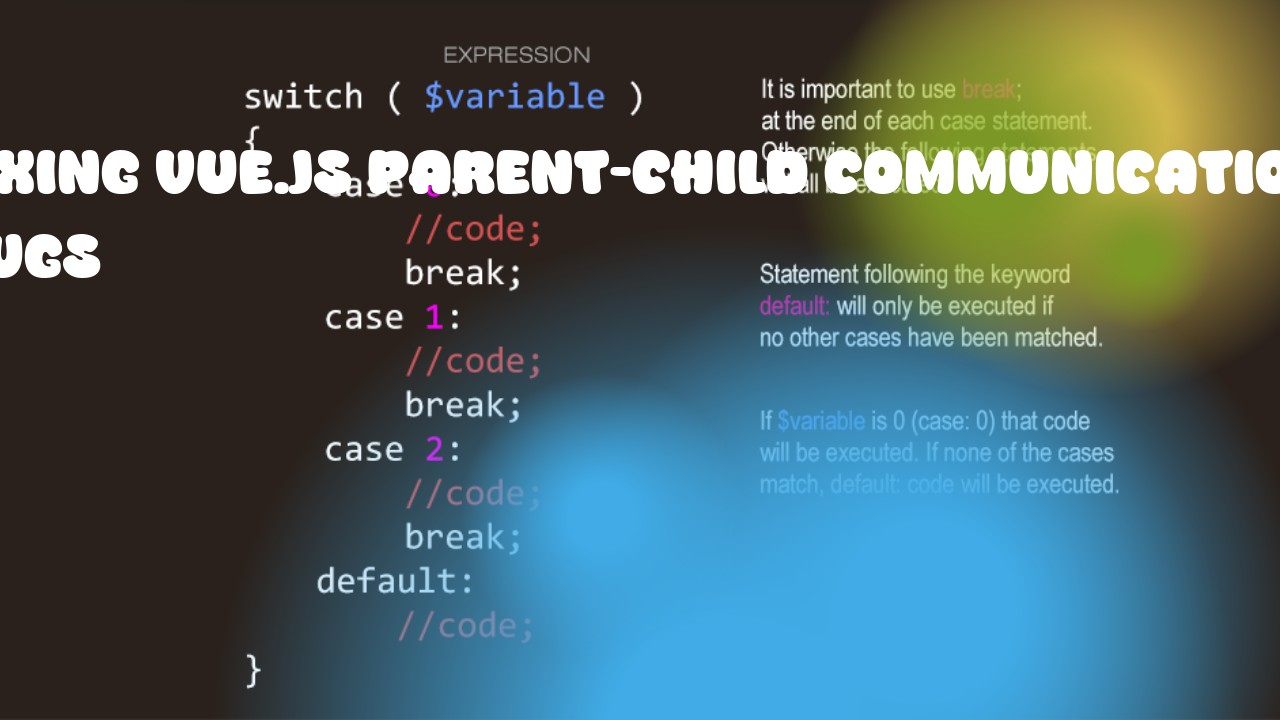Vue.js is a popular JavaScript framework for building user interfaces, and it provides several ways to communicate between parent and child components. Here are some common bugs that might occur during this communication and how to fix them:
-
Props not receiving updated values: If you pass data from a parent component to a child using props, ensure that the prop value is updated whenever necessary. You can use Vuex for state management or
watchproperties in the child component to react to changes in the parent component's props.<!-- Parent Component --> <template> <div> <child-component :parent-data="parentData"></child-component> </div> </template> <script> import ChildComponent from './ChildComponent.vue'; export default { data() { return { parentData: 'Initial Data', }; }, components: { ChildComponent, }, watch: { parentData(newValue) { // Update the child component's props when the parent data changes this.$refs.childComponent.childProp = newValue; }, }, }; </script> <!-- Child Component --> <template> <div ref="childComponent"> {{ childProp }} </div> </template> <script> export default { props: ['parentData'], data() { return { childProp: '', }; }, mounted() { this.childProp = this.parentData; // Initialize the child prop with the parent data }, }; </script> -
Child not re-rendering when props change: If you update a prop passed to a child component, but the child component does not re-render, you can try using the
v-bindor:shorthand for updating props and ensure that you're not mutating the original data. Use the$forceUpdate()method if necessary, though it should be used sparingly as it can cause performance issues.<!-- Parent Component --> <template> <div> <child-component :parent-data="parentData"></child-component> </div> </template> <script> import ChildComponent from './ChildComponent.vue'; export default { data() { return { parentData: 'Initial Data', }; }, components: { ChildComponent, }, methods: { updateParentData(newValue) { this.parentData = newValue; // Update the parent data directly this.$nextTick(() => { // Ensure the child component re-renders after updating props }); }, }, }; </script> <!-- Child Component --> <template> <div ref="childComponent"> {{ parentData }} </div> </template> <script> export default { props: ['parentData'], }; </script> -
Circular reference causing memory leaks: If you have a nested structure of components and one component is updating props passed to its children, that can lead to an infinite loop and memory leaks if not handled properly. Ensure your components are designed well with the right communication patterns in mind.
<!-- Parent Component --> <template> <div> <child-component :parent-data="parentData"></child-component> </div> </template> <script> import ChildComponent from './ChildComponent.vue'; export default { data() { return { parentData: 'Initial Data', }; }, components: { ChildComponent, }, methods: { updateParentData(newValue) { this.parentData = newValue; // Update the parent data directly }, }, }; </script> <!-- Child Component --> <template> <div ref="childComponent"> {{ parentData }} </div> </template> <script> export default { props: ['parentData'], created() { // Register an event listener to update the parent data from a child component this.$on('updateParent', (newValue) => { this.parentData = newValue; }); }, }; </script> -
Avoid mutating props directly: Props should be considered read-only in Vue.js components, and trying to modify them directly can lead to unexpected behavior. Instead, consider using the
v-modeldirective or emitting events from child components to update the parent component's state.<!-- Parent Component --> <template> <div> <child-component v-model="parentData"></child-component> </div> </template> <script> import ChildComponent from './ChildComponent.vue'; export default { data() { return { parentData: 'Initial Data', }; }, components: { ChildComponent, }, }; </script> <!-- Child Component --> <template> <div ref="childComponent"> <input v-model="localData" @blur="emitUpdateEvent"> </div> </template> <script> export default { props: ['value'], data() { return { localData: this.value, // Initialize with the parent value }; }, methods: { emitUpdateEvent() { this.$emit('input', this.localData); // Emit an event with the updated value }, }, }; </script>
By following these guidelines, you can effectively manage and debug Vue.js parent-child communication issues.

